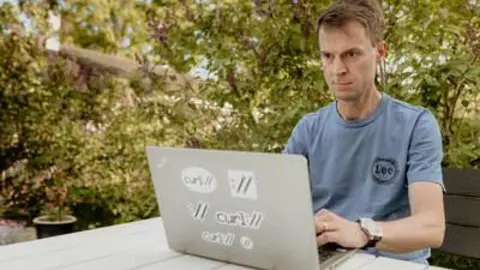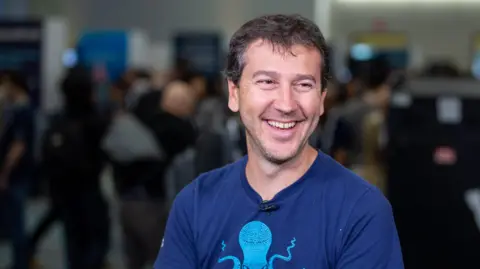Expertise Reporter
 Daniel Stenberg
Daniel StenbergMany people have ready directions and demanding info for our household within the occasion of our sudden demise. For Daniel Stenberg, that features passwords for his Google and GitHub accounts.
That’s as a result of he’s the founding father of curl, an open supply web switch engine that has been downloaded billions of instances and is used to switch information to and from laptop servers.
It was first launched by Mr Stenberg in 1996 and is now utilized by tens of millions ever day.
It is necessary that somebody is ready to keep curl when he steps away.
“I simply wish to ensure that all the things is there so the day I’m going away, somebody can take over,” Mr Stenberg says.
It’s an issue confronting most of the open supply software program pioneers who reworked the expertise world within the Nineties and early 2000s.
Their ethos was that anybody may contribute to the event of an open supply software or working system – and the software program and underlying code might be used, modified, and distributed free of charge.
The open supply motion broke the stranglehold of massive expertise corporations, spurred innovation and underpins a lot of at present’s expertise panorama.
In 1999, Loris Degioanni made his first contributions to an open supply community evaluation software that finally grew to become Wireshark, as a part of his grasp’s thesis. “My concern was graduating,” he says, not succession planning or the long-term way forward for the venture.
Virtually 30 years on, Mr Degioanni is now CTO and founding father of cybersecurity agency Sysdig, which is a key sponsor of Wireshark.
“We’re approaching the time when the founders of those early open supply tasks are beginning to get outdated,” he says.
 Sysdig
SysdigWhereas tasks do come and go, he explains, some stay related through the years, and founders and maintainers normally wish to guarantee they stay on whereas there may be demand. That’s not simply because they’ve invested time in creating the code itself, but in addition as a result of they’ve spawned communities, each digital and in the actual world.
However whereas the likes of Mr Stenberg and Mr Degioanni can take motion to make sure the keys to the dominion are handed on, making certain there may be somebody to cross them to is usually a problem.
Many within the open supply neighborhood fear there should not sufficient youthful builders keen to get entangled in contributing to or sustaining tasks. That is usually unpaid work afterall.
Even Linus Torvalds, the creator of Linux, the working system which kick-started the open supply revolution within the early Nineties, famous on the Open Supply Summit Europe in September that the “kernel maintainers are growing old”.
Amanda Brock, CEO of OpenUK, a non-profit group which represents the UK’s open expertise neighborhood, says youthful builders may not recognize the grip that closed software program corporations had in earlier many years.
“You have received a subsequent technology who have not engaged as a philanthropic neighborhood and volunteer neighborhood in the identical approach, on the similar scale.”
There are expertise boundaries to handle too. Many key open supply tasks have been initially written in C, a coding language first developed within the early Seventies.
Whereas C remains to be taught in universities, it’s not extensively used within the industrial world, Mr Degioanni explains. “The truth that C is the primary language makes it tougher to draw a youthful technology.”
 OpenUK
OpenUKThere are methods to work round this. Mr Degioanni says each Wireshark and one other venture he based, Falco, depend on “plug-ins”, which might permit new performance to be written in numerous languages.
Mr Torvalds has given his blessing to the adoption of Rust as a programming language for Linux, whereas noting the “Rust versus C dialogue has taken virtually non secular overtones in sure areas.”
In the case of steering tasks into the long run, leaders and maintainers have the choice of handing over management to foundations. The Cloud Native Computing Basis, for instance, oversees 208 tasks, with greater than 250,000 contributors. Wireshark has its personal impartial basis, with Mr Degioanni as a board member.
 Getty Photos
Getty PhotosNot everybody subscribes to the inspiration mannequin. Stenberg and his collaborators have saved curl utterly impartial. “I am significantly better off with out being of their neighbourhoods and simply working my very own neighbourhood,” he says.
And foundations nonetheless face the problem of making certain a gradual provide of contemporary builders to maintain tasks alive, he notes.
Miss Brock says it’s important that the open supply neighborhood think about the way it encourages youthful folks to take part.
That is about displaying that whereas being a contributor might be difficult it’s additionally profession enhancing, giving younger folks an entry into established ecosystems and a possibility to finesse and spotlight their technical abilities.
“It is a approach to assist STEM expertise flight,” Miss Brock provides. “As a result of folks can make money working from home within the UK or no matter nation they’re in.”
Degioanni is extra sanguine. Even when there’s “most likely much less visceral enthusiasm” for the idea of open supply, he says, the elemental thought of having the ability to modify software program is now a given.
And, he continues, “I’ve labored with open supply my complete life. I’ve created my very own tasks. I’ve seen folks be part of the tasks that I created. I’ve seen folks begin their very own open supply tasks.”
In the end, he says, there’s a “pleasure, particularly for a youngster” in creating software program, seeing it getting used and sparking a neighborhood.
“That feeling would not get outdated,” he says. Even when the pioneers who popularized the earliest open supply tasks do.

